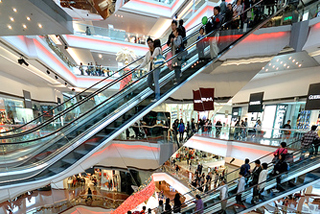New Delhi/Mumbai Feb 24: A severe shortage of attractive malls has made setting up shop in India easier said than done, crimping expansion plans for both foreign retailers such as Lacoste and domestic giants like department store chain Shoppers Stop.
 India's searing heat, heavy traffic and cluttered pavements make malls the most popular option for urban middle class consumers looking for a day out. But many centres - despite having been built in the last decade - are struggling to draw shoppers or retailers because of poor design or because they are difficult to manage.
India's searing heat, heavy traffic and cluttered pavements make malls the most popular option for urban middle class consumers looking for a day out. But many centres - despite having been built in the last decade - are struggling to draw shoppers or retailers because of poor design or because they are difficult to manage.
P.S. Puri, CEO of MGF Mall Management, which runs MGF Metropolitan, knows this all too well. Located in a posh district in the south of New Delhi, security guards and sales staff outnumbered shoppers last Tuesday evening in what was once a bustling mall.
It has restaurants but lacks popular attractions like a food court and a cinema. The sale of shop ownership piecemeal has made management difficult and now only one quarter of the space is occupied by fashion retailers - about the same amount that is vacant.
"There is very little we can do because the shops are sold and the owners bring in whomever they want. They lease it to a liquor shop because they get slightly higher rents but then no other retailer wants to be next to a liquor store," said Puri.
Recently built malls where shops are leased, not sold, are faring better but there are not yet enough of them to meet a forecast rapid increase in demand as the economy improves.
"There are very few projects coming up in the next one or two years where we can open a store," said Rajesh Jain, CEO at French sportswear maker Lacoste' India division. "This is really restricting our expansion for sure."
FIRST FORAYS
Revenue from organised bricks-and-mortar retail in India is expected to more than triple to $150 billion by 2020, according to consulting firm Technopak - spurred by a raft of foreign retailers planning their first foray into the market, heating up competition for mall space.
In the past six months, Gap Inc (GPS.N) has said it plans 40 stores, The Children's Place (PLCE.O) is looking at 50 while Hennes & Mauritz (H&M) (HMb.ST) has plans for an initial 50 shops. Established brands are also expanding, with Marks & Spencer (MKS.L) aiming to lift its store numbers to 80 from 45 by 2016/17.
But India has only 77.6 million square feet of mall space, less than one tenth of U.S. levels, despite having nearly four times the population, with the shortage of attractive malls most acute in New Delhi and Mumbai.
One in every six stores is empty, according to property consultants Jones Lang LaSalle, while advisory and management firm Beyond Squarefeet estimates that up to 25 malls have been shut or converted to other uses in the past two years. That does not include two of Mumbai's oldest suburban malls, Centre One and Nirmal Lifestyle, which have said they are shutting down as shoppers stayed away.
Many centres, especially those that went up during the 2006-2007 real estate boom, were built by developers with little mall building experience. Ownership of shops was often sold off piecemeal while many do not have sufficient parking for shoppers or areas for retailers to bring in their supplies.
"Many of the malls that grew up did not even think of these things," said Kumar Rajagopalan, CEO of the Retailers' Association of India.
Until new and better malls are built, some retailers are looking at alternatives such as leasing standalone shops that can often be less lucrative or investing big in fast-growing but nascent online services.
"We...have to look at online spaces in a bigger way much earlier than before, because there is definitely a big shortage (of physical retail space)," said Govind Shrikhande, managing director at Shoppers Stop.





Comments
Add new comment